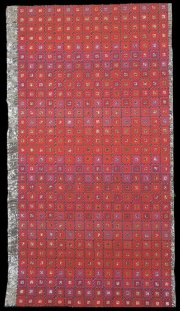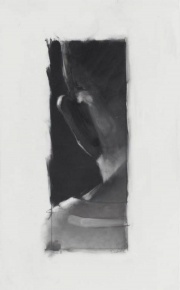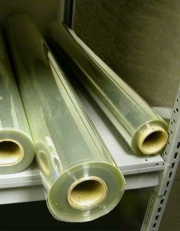Difference between revisions of "Mylar"
| Line 1: | Line 1: | ||
| − | [[File:2001.133-SC58698.jpg|thumb|]] | + | [[File:2001.133-SC58698.jpg|thumb|Furnishing fabric<br>MFA# 2001.133]] |
== Description == | == Description == | ||
| − | + | [[File:2002.683-SC53956.jpg|thumb|Oil and graphite on mylar<br>MFA# 2002.683]] | |
[DuPont Teijin Films, Hopewell, VA] A registered trademark for a series of optically clear, colorless, thermoplastic [[polyester_film|polyester films]]. First introduced in the early 1950s, Mylar® is composed of polyethylene terephthalate. It is a biaxially oriented film that is chemically inert and dimensionally stable. Mylar is an effective barrier to moisture, oil and grease. It has been used for lamination, coating, embossing, printing, and dyeing. Mylar has been also used for heat seal packaging. Mylar® type D sheets are uncoated and have been used for enclosing photographs and coins as well as for making photocorners. | [DuPont Teijin Films, Hopewell, VA] A registered trademark for a series of optically clear, colorless, thermoplastic [[polyester_film|polyester films]]. First introduced in the early 1950s, Mylar® is composed of polyethylene terephthalate. It is a biaxially oriented film that is chemically inert and dimensionally stable. Mylar is an effective barrier to moisture, oil and grease. It has been used for lamination, coating, embossing, printing, and dyeing. Mylar has been also used for heat seal packaging. Mylar® type D sheets are uncoated and have been used for enclosing photographs and coins as well as for making photocorners. | ||
Note: Mylar® type D sheets were discontinued September 2001 by DuPont. | Note: Mylar® type D sheets were discontinued September 2001 by DuPont. | ||
| − | + | [[File:mylar.jpg|thumb|Rolls of Mylar film]] | |
| − | [[File: | ||
| − | |||
== Synonyms and Related Terms == | == Synonyms and Related Terms == | ||
| Line 13: | Line 11: | ||
Similar products: Melinex type 516 | Similar products: Melinex type 516 | ||
| − | |||
| − | |||
== Personal Risks == | == Personal Risks == | ||
| − | Difficult to ignite. Burns with a shiny, yellow-orange, sooty flame. Self-extinguishing. | + | * Difficult to ignite. |
| − | + | * Burns with a shiny, yellow-orange, sooty flame. Self-extinguishing. | |
| − | Polymer Plastics: [[https://www.polymerplastics.com/images/msds_sheets/Mylar.pdf| Safety Data Sheets]] | + | * Polymer Plastics: [[https://www.polymerplastics.com/images/msds_sheets/Mylar.pdf| Safety Data Sheets]] |
| − | |||
| − | |||
== Physical and Chemical Properties == | == Physical and Chemical Properties == | ||
| − | Resistant to cold acids, weak alkalis, bleach and most organic solvents. Degrades in strong alkalis, strong hot acids, cresol. | + | * Resistant to cold acids, weak alkalis, bleach and most organic solvents. Degrades in strong alkalis, strong hot acids, cresol. |
| − | + | * For a 1 mil film: Oxygen transmission = 19-32 ml/m2d; Water vapor transmission = 45-60 g/m2d; | |
| − | For a 1 mil film: Oxygen transmission = 19-32 ml/m2d; Water vapor transmission = 45-60 g/m2d; | ||
{| class="wikitable" | {| class="wikitable" | ||
|- | |- | ||
! scope="row"| Melting Point | ! scope="row"| Melting Point | ||
| − | | 250-260 | + | | 250-260 C |
|- | |- | ||
! scope="row"| Density | ! scope="row"| Density | ||
| − | | 1.38 | + | | 1.38 g/ml |
|- | |- | ||
! scope="row"| Refractive Index | ! scope="row"| Refractive Index | ||
| 1.54, 1.72 | | 1.54, 1.72 | ||
|} | |} | ||
| − | |||
| − | |||
== Resources and Citations == | == Resources and Citations == | ||
Revision as of 18:57, 3 August 2022
Description
[DuPont Teijin Films, Hopewell, VA] A registered trademark for a series of optically clear, colorless, thermoplastic polyester films. First introduced in the early 1950s, Mylar® is composed of polyethylene terephthalate. It is a biaxially oriented film that is chemically inert and dimensionally stable. Mylar is an effective barrier to moisture, oil and grease. It has been used for lamination, coating, embossing, printing, and dyeing. Mylar has been also used for heat seal packaging. Mylar® type D sheets are uncoated and have been used for enclosing photographs and coins as well as for making photocorners.
Note: Mylar® type D sheets were discontinued September 2001 by DuPont.
Synonyms and Related Terms
PET; Mylar [Du Pont]; Hostaphan [Mitsubishi]; Claryl [Toray]; 3M Polyester [3M]; Questar {Filmquest]; polyesterr; polyethylene terephthalate; tereftalato de polietileno (Esp.)
Similar products: Melinex type 516
Personal Risks
- Difficult to ignite.
- Burns with a shiny, yellow-orange, sooty flame. Self-extinguishing.
- Polymer Plastics: [Safety Data Sheets]
Physical and Chemical Properties
- Resistant to cold acids, weak alkalis, bleach and most organic solvents. Degrades in strong alkalis, strong hot acids, cresol.
- For a 1 mil film: Oxygen transmission = 19-32 ml/m2d; Water vapor transmission = 45-60 g/m2d;
| Melting Point | 250-260 C |
|---|---|
| Density | 1.38 g/ml |
| Refractive Index | 1.54, 1.72 |
Resources and Citations
- DuPont Teijin: [Films Database]
- Rachael Perkins Arenstein, Lisa Goldberg, and Eugenie Milroy, ‘Support and Rehousing for Collection Storage’ In ‘Preventive Conservation: Collection Storage’ Lisa Elkin and Christopher A. Norris (eds.), Society for the Preservation of Natural History Collections, New York. 2019.
- G.S.Brady, Materials Handbook, McGraw-Hill Book Co., New York, 1971 Comment: p. 625
- Marjorie Shelley, The Care and Handling of Art Objects, The Metropolitan Museum, New York, 1987
- Caring for your Collections, Arthur W Schulz (ed.), Harry N. Abrams, Inc. , New York, 1992
- Pam Hatchfield, Pollutants in the Museum Environment, Archetype Press, London, 2002
- Marjory L. Joseph, Introductory Textile Science, Holt, Rinehart and Winston, Fort Worth, TX, 1986
- Identification of Textile Materials, The Textile Institute, Manchester, England, 1985
- Wikipedia: http://en.wikipedia.org/wiki/Mylar (Accessed Sept. 10, 2005)
- Teri Hensick, contributed information, 1998


